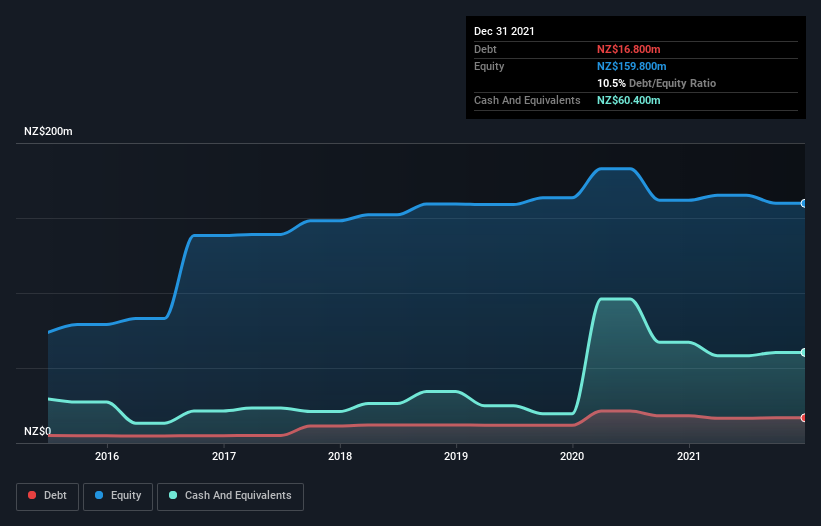Is Vista Group International (NZSE:VGL) Using Debt Sensibly?
Some say volatility, rather than debt, is the best way to think about risk as an investor, but Warren Buffett famously said that 'Volatility is far from synonymous with risk.' So it seems the smart money knows that debt - which is usually involved in bankruptcies - is a very important factor, when you assess how risky a company is. We can see that Vista Group International Limited (NZSE:VGL) does use debt in its business. But the real question is whether this debt is making the company risky.
What Risk Does Debt Bring?
Debt and other liabilities become risky for a business when it cannot easily fulfill those obligations, either with free cash flow or by raising capital at an attractive price. In the worst case scenario, a company can go bankrupt if it cannot pay its creditors. While that is not too common, we often do see indebted companies permanently diluting shareholders because lenders force them to raise capital at a distressed price. By replacing dilution, though, debt can be an extremely good tool for businesses that need capital to invest in growth at high rates of return. When we think about a company's use of debt, we first look at cash and debt together.
Check out our latest analysis for Vista Group International
What Is Vista Group International's Net Debt?
The image below, which you can click on for greater detail, shows that Vista Group International had debt of NZ$16.8m at the end of December 2021, a reduction from NZ$18.1m over a year. But it also has NZ$60.4m in cash to offset that, meaning it has NZ$43.6m net cash.
How Healthy Is Vista Group International's Balance Sheet?
We can see from the most recent balance sheet that Vista Group International had liabilities of NZ$47.6m falling due within a year, and liabilities of NZ$35.7m due beyond that. Offsetting this, it had NZ$60.4m in cash and NZ$35.5m in receivables that were due within 12 months. So it actually has NZ$12.6m more liquid assets than total liabilities.
This surplus suggests that Vista Group International has a conservative balance sheet, and could probably eliminate its debt without much difficulty. Succinctly put, Vista Group International boasts net cash, so it's fair to say it does not have a heavy debt load! There's no doubt that we learn most about debt from the balance sheet. But it is future earnings, more than anything, that will determine Vista Group International's ability to maintain a healthy balance sheet going forward. So if you want to see what the professionals think, you might find this free report on analyst profit forecasts to be interesting.
Over 12 months, Vista Group International reported revenue of NZ$98m, which is a gain of 12%, although it did not report any earnings before interest and tax. That rate of growth is a bit slow for our taste, but it takes all types to make a world.
So How Risky Is Vista Group International?
By their very nature companies that are losing money are more risky than those with a long history of profitability. And in the last year Vista Group International had an earnings before interest and tax (EBIT) loss, truth be told. Indeed, in that time it burnt through NZ$1.5m of cash and made a loss of NZ$9.8m. Given it only has net cash of NZ$43.6m, the company may need to raise more capital if it doesn't reach break-even soon. Even though its balance sheet seems sufficiently liquid, debt always makes us a little nervous if a company doesn't produce free cash flow regularly. For riskier companies like Vista Group International I always like to keep an eye on whether insiders are buying or selling. So click here if you want to find out for yourself.
When all is said and done, sometimes its easier to focus on companies that don't even need debt. Readers can access a list of growth stocks with zero net debt 100% free, right now.
Have feedback on this article? Concerned about the content? Get in touch with us directly. Alternatively, email editorial-team (at) simplywallst.com.
This article by Simply Wall St is general in nature. We provide commentary based on historical data and analyst forecasts only using an unbiased methodology and our articles are not intended to be financial advice. It does not constitute a recommendation to buy or sell any stock, and does not take account of your objectives, or your financial situation. We aim to bring you long-term focused analysis driven by fundamental data. Note that our analysis may not factor in the latest price-sensitive company announcements or qualitative material. Simply Wall St has no position in any stocks mentioned.

 Yahoo Finance
Yahoo Finance 
